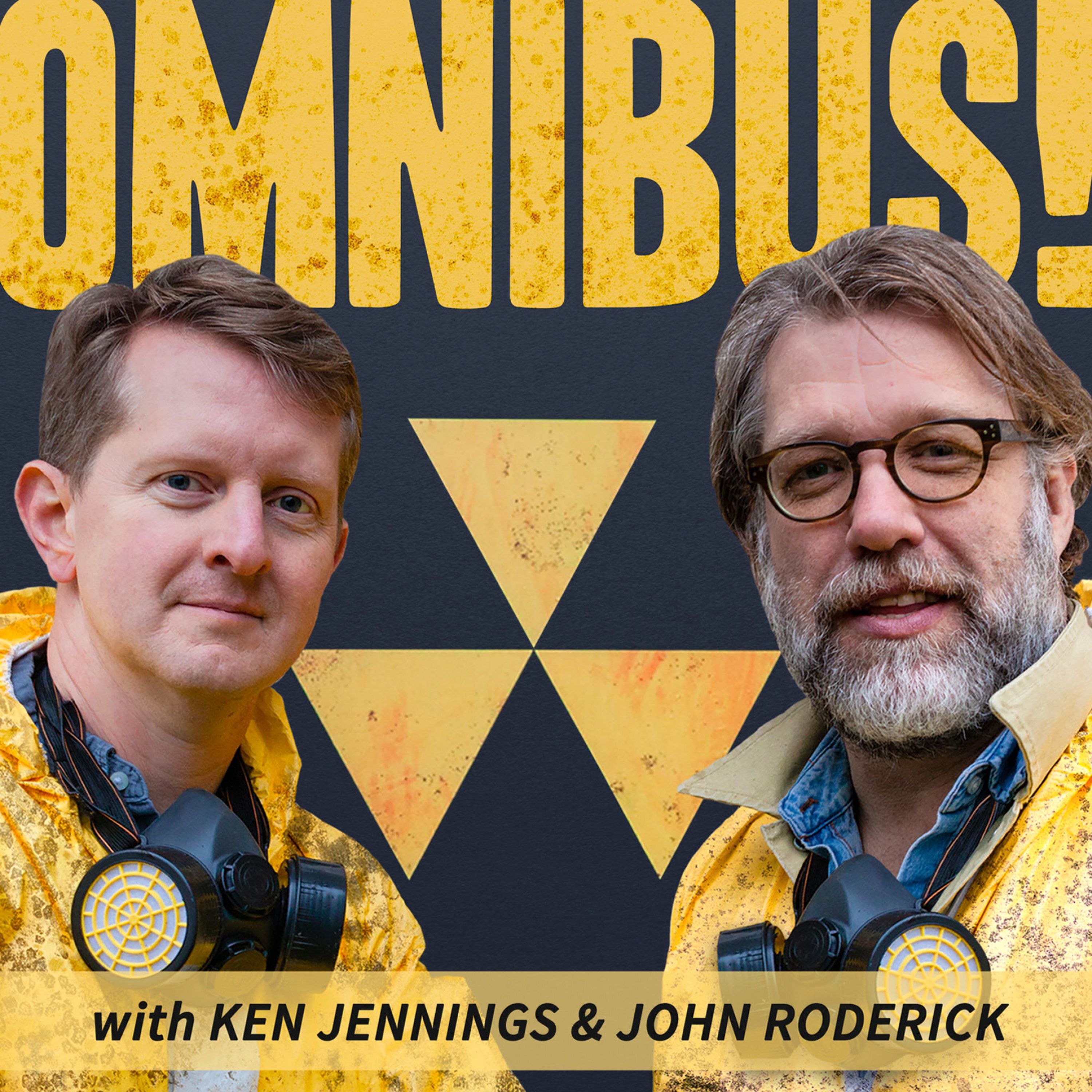
Epic Greek History
Embark on an epic journey through ancient Greece with history enthusiast Scott Emmons as your guide. From the Mycenaean warrior kings to the flowering of the Greek city-state, from the astonishing victories over the Persian invaders to the catastrophic power struggle between Athens and Sparta, each episode brings the past to life with vivid detail and compelling narrative. Along the way, there will be side trips to explore fascinating aspects of Greek culture, from art and literature to everyday life. Whether you're a history buff or new to the world of classical antiquity, this podcast is your gateway to the life and legacy of ancient Greece.
Publishes one full episode and one short episode per month.
See images for each episode at epicgreekhistory.substack.com
Epic Greek History
Introduction: Greece Is the Word
Welcome to the first episode of Epic Greek History! In this introduction, amateur historian Scott Emmons lays out his vision for this podcast. Taking inspiration from two of his favorite history podcasts, he'll focus on the human experience in a way that he hopes will bring ancient Greece to life. His guiding principle will be a short quote by historian Neville Morley: "History is a kind of story."
See the Substack companion to this podcast at epicgreekhistory.substack.com
Hello, and welcome to the first episode of Epic Greek History. I’m Scott Emmons, and in this podcast I’ll be telling the story of ancient Greece from its Bronze Age beginnings to the conquests of Alexander the Great and maybe even beyond.
I say “telling the story” because that’s the way I want to approach this podcast. The title is “Epic Greek History,” and I mean “epic” in two ways. There’s the casual meaning, that Greek history is like, “totally epic, dude!” But there’s also the traditional meaning — big and expansive, yes, but also a narrative. A story. That’s what I think works best in a format like this. My favorite history podcasts are a couple of obvious ones — Dan Carlin’s “Hardcore History” and Daniele Bolelli’s “History on Fire.” Not so much because I love six-hour episodes, but because of their focus on the human experience. It’s one thing to learn about what happened and when, what socioeconomic forces were at work, and so on — but it’s something else again to try to imagine the experience of the people who lived through historical events. So I’m taking my inspiration mainly from those two, and I hope to tell the story in a way that will bring ancient Greece to life.
Now, I’m going to take a page from Mr. Carlin’s book and start with the disclaimer that I’m not a historian. A long, long time ago, I completed a Ph.D. in classics, which is the confusing term that people in the humanities use to mean ancient Greek and Roman studies. My focus was more literary than historical, and to be honest, I wasn’t 100% cut out for the academic life. So, after teaching for a couple of years, I ditched my academic career for a job on the humor writing staff at Hallmark, then wrote for JibJab, and later for the StoryBots children’s series on Netflix. Yeah, you could say I have an unusual resume. But the point is, even though I have a background in classics, I’m not trained in the methods of historical research, and I’m not qualified to weigh in on the complex issues that real historians debate. As of this recording, there are some big gaps in my knowledge of Greek history, and for a lot of this podcast, I’ll be learning right along with you. But there are advantages to not being a professional historian. It gives me a little more freedom to speculate about events and general trends, and just to focus on what’s most interesting to me — and what I hope will resonate with you.
But why focus on ancient Greece in the first place? My knee-jerk answer to that is, “Because it’s absolutely fascinating!” The more I learn about it, the more absorbing it becomes. But that’s a very subjective answer. If I were to dive deep into the history of the Navajo nation or the Edo period in Japan, I’m sure I’d find it just as captivating. So outside of being personally drawn to it, what’s the value of learning about ancient Greece? Well, if you could go back a couple hundred years and put that question to any educated American or European, the answer would be obvious. Western civilization is the greatest thing that’s ever happened to the world, and it all started with the Greeks! So if there was manifest destiny in the United States, or if the sun never set on the British Empire, western powers were spreading a glorious cultural tradition, and all those lucky colonized people got to benefit from it.
Well, today the picture is a little more complicated. Here in the 21st century we have a more inclusive view of what other cultures have contributed to the world. At least we should, in my opinion. And that involves some rethinking about how we perceive our own past. I started graduate school in classics right about the time students at the more progressive universities started shouting, “Hey, hey! Ho, ho! Western Civ has got to go!” Now, having taught at a college myself, I’m sure a lot of those students just wanted to get out of a required course. But they had a point, that those classes were often taught in a way that tended to glorify Western history without acknowledging some of the downsides. Now, I’m all in on a more inclusive view of world history, but at the same time I don’t see a need to deny certain historical realities. When I listen to history podcasts, I’m struck by how often I hear phrases like, “what we’ve come to call quote-unquote Western Civilization.” Okay, maybe “civilization” is a value-loaded term, but I don’t think we need scare quotes to talk about western culture. If you live in the United States or western Europe, you have a certain shared cultural heritage. As the English poet Percy Shelley wrote back in the 19th century, “We are all Greeks. Our laws, our literature, our religion, our arts have their roots in Greece.”
I have an item I’d like to add to Shelley’s list. The podcast you’re listening to is in English. And the English language is full of Greek vocabulary. A lot of words came through Latin, usually by way of French, others are more recent coinages from Greek roots. Think of our political words — like the one I just used, “political.” Or democracy. Oligarchy. Anarchy. Utopia. All borrowed from Greek. Then there are the scientific and technological terms — telescope, microscope, physics, astronomy, planet, galaxy, biology, photography, any of the -ologies and -ographies. In music we have melody, harmony, orchestra; in theater, drama, tragedy, comedy. We have everyday words like Diet! Energy! Airplane! Poem, cinema, astronaut, architect, athlete, acrobat, and yes, history! Whenever we use any of those words, it’s a tiny particle of Greek culture asserting itself in our language.
No matter how we feel about western culture, the influence of ancient Greece is all around us. Many of the best-known works of western art have Greek roots or represent Greek subjects. Modern playwrights and screenwriters still find inspiration in ancient Greek models. Only a decade ago, Spike Lee produced his film Chi-Raq, a modern retelling of the comedy Lysistrata by Aristophanes. And of course, if you’re a citizen of the U.S., the framers of your constitution drew heavily on the Greek and Roman political systems they studied. That connection is reflected in our political architecture. There’s a reason the front of the Supreme Court building looks like a Greek temple.
So learning about ancient Greece can give us a deeper understanding of our own culture. I think there’s real value in that. On the other hand, when I put it that way, it almost amounts to saying, “It’s good for you.” And I don’t want this to be the podcast equivalent of eating your kale and getting your 10 thousand steps a day. I meant what I said earlier, that Greek history, to me at least, is endlessly fascinating. So I’d like to spend the rest of this introduction on a couple of examples of what I’m talking about — features of ancient Greek culture that make it so intriguing to me.
First, let’s talk about competition. Any introduction to ancient Greece will mention the high value placed on excellence, or arete in Greek. That manifests itself in a powerful competitive drive. Starting with Homer’s Iliadand Odyssey, the earliest Greek literature we have, there’s an enormous emphasis on striving to be the best. And “best” is a superlative. It implies comparisons. The only way to be the best is to surpass others in excellence. The Homeric heroes are always in competition with each other, mainly for glory in battle, but in other areas too. Achilles is the best in sheer strength and fighting ability. Odysseus is the cleverest. Even the soothsayer Calchas is described as “by far the best of the seers.”
Of course, the Homeric heroes are kings and noblemen, so we might ask, does that competitive mindset operate outside of their class?” Well, another early Greek poet, Hesiod, answers that question in a poem called “Works and Days.” In the early part of the poem he talks about strife, and he tells us that there are two kinds. There’s the bad strife that leads to feuds and wars and so on. But there’s also a good kind of strife, which operates as competition. I’ll read this passage now from the Penguin translation by Dorothea Wender. Personifying the good Strife as a goddess, Hesiod says, quote:
She urges even lazy men to work:
A man grows eager, seeing another rich
From plowing, planting, ordering his house;
So neighbor vies with neighbor in the rush
For wealth: this Strife is good for mortal men—
Potter hates potter; carpenters compete
And beggar strives with beggar, bard with bard.
Unquote
So according to Hesiod, that spirit of competition operates in every class of society. A farmer envies his neighbor’s success, and that spurs him to work harder and make his own farm better. The same is true for potters, builders, even beggars! I’ve always wondered how that would even work. Do you sign up for a seminar that teaches you the ten powerful secrets to maximizing your panhandling potential? Hesiod doesn’t tell us. Which, if you ask me, is kind of a missed opportunity.
In any case, competition is everywhere you look in the ancient Greek world. Are we going to have a festival at Olympia to honor Zeus? Great, we’ll celebrate with athletic competitions. Zeus loves those, right? How about a dramatic festival to honor Dionysus? Hey, let’s make it a contest to decide which production is the best! Another Athenian festival of Dionysus included an event called Choes, which basically meant “wine-jugs.” And how did they celebrate it? With contests to see who could drain their wine-jug the fastest. Again and again, you see the idea of competition as the driving force behind accomplishment and excellence.
But there’s a flip side to the competition coin, and that brings us to the second feature of Greek culture I want to highlight — the obsession with moderation. “Nothing to excess” was more than just a catchphrase, it was literally written in stone as one of the inscriptions in the temple of Apollo at Delphi. And I think moderation and competition are kind of a yin and yang in Greek culture. If you’re a super competitive person, chances are you have a tendency to go to extremes. To win at all costs. In our own highly competitive society we have words like “cutthroat” for people who’ll stop at nothing to get ahead. Competition can easily get out of hand, and when it does, it turns into the bad kind of strife that Hesiod warns about.
There’s also the danger that if you have too much success, you might start trying to compete with the gods. This is one of the major sources of tension in the ancient Greek world view. The Greeks thought of humans as having divine qualities. The Homeric heroes often have epithets like “godlike” or even “equal to a god.” It couldn’t be more different from the Christian conception that humans are lowly creatures plagued by sin, and that they need a divine savior for their lives to have any value. The Greek view was that human excellence was a wonderful thing. It was good to achieve and to be the best. And yet, humans are not gods. Unlike gods, humans die. And the gods are always going to be stronger and more beautiful. Greek myths warn again and again that if you try to put yourself on the same level with a god, you’re going to get smacked down. This is an example of that speculation I talked about earlier, that I can indulge in because I’m not a historian. But I think one reason moderation was so important to the Greeks was that it provided a check on the competitive drive that was so ingrained in their culture.
So those are the kinds of broad topics I want to explore in this podcast. At the same time, I want to make sure it has a good, solid grounding in historical facts. That’s much easier said than done, because just about every topic in ancient Greek history is debated. But as a non-historian, I’m not going to spend a lot of time arguing for one interpretation of evidence over another. In most cases I’ll offer what I think of as a mainstream view of historical events — what you might find in a standard college textbook. But since it’s a podcast and not a textbook, there’s plenty of room for speculation and digressions. You can be sure I’ll go down a few rabbit holes. My aim is to produce something that will be interesting to history buffs or people who know a little about ancient Greece and would like to learn more. As I put out more episodes, I hope it will be a helpful supplement for students taking introductory classes in Greek history. Above all, I’ll try to keep it interesting. My guiding principle will be a simple statement from a book called Writing Ancient History by Neville Morley: History is a kind of story.
And that’s a wrap for this introduction. In the next episode we’ll look at the discovery of Bronze Age Greece and how it revolutionized the way we think about early Greek history. Before I finish, though, I want to thank a couple of people who’ve helped me pull this podcast together. Chris Harding is the super-talented artist who designed my logo and the artwork that appears on the homepage at epicgreekhistory.com. You can check out more of his work at chrisharding.net. The incomparable Parry Gripp, lead singer and guitarist for Nerf Herder, set my lyrics to music and recorded the theme song as well as some stingers I’ll use in later episodes. If you’re looking for a hilarious earworm, check out his songs at parrygripp.com. Guys, I can’t thank you enough! For those listening, I hope you’ve enjoyed this episode, and if you did, please subscribe and spread the word. I’m Scott Emmons. Thanks for listening!
Podcasts we love
Check out these other fine podcasts recommended by us, not an algorithm.

Dan Carlin's Hardcore History
Dan Carlin
History on Fire
Daniele Bolelli
Stuff You Should Know
iHeartPodcasts
Ancient Greece Declassified
Dr. Lantern Jack
Omnibus
Omnibus
Stuff To Blow Your Mind
iHeartPodcasts
Literature and History
Doug Metzger
Office Ladies
Audacy & Jenna Fischer and Angela Kinsey
Good Hang with Amy Poehler
The Ringer